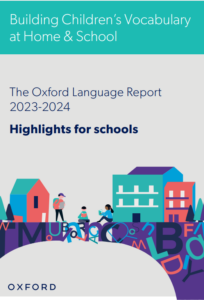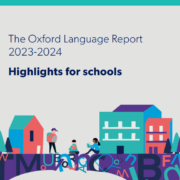OUP Study raises concerns about vocabulary development
 Oxford University Press’ (OUP) Oxford Language Report, an annual study of vocabulary development in under 18s in the UK, points to an increasing number of children in the UK falling behind in their English vocabulary development. More than 800 teachers and parents were surveyed across the UK as part of research and a majority of teachers felt this is impacting their learning.
Oxford University Press’ (OUP) Oxford Language Report, an annual study of vocabulary development in under 18s in the UK, points to an increasing number of children in the UK falling behind in their English vocabulary development. More than 800 teachers and parents were surveyed across the UK as part of research and a majority of teachers felt this is impacting their learning.
Teachers are keen for schools to work with parents to tackle the issue, with 85% believing schools could do more to encourage parents to be involved in their child’s vocabulary development. Equally over two thirds of parents surveyed are eager to engage with schools, with 68% of parents welcoming more guidance when it comes to developing their child’s vocabulary.
Overwhelmingly, teachers highlight the significant consequences of the pandemic with 95% believing school closures and disruptions during Covid-19 contributed to a widening vocabulary gap. The study publishes as OUP reveals plans for the second year of its Raise a Reader initiative. Launched in 2022 in partnership with the National Literacy Trust, Raise a Reader aims to support children’s literacy in the wake of the pandemic.
To help tackle the issue, OUP will be extending its Oxfordshire Raise a Reader programme to an additional ten schools across the county in 2024, including Banbury, Witney and Oxford. Almost 3,000 children growing up in some of the most disadvantaged areas in Oxfordshire benefitted from the programme in 2023, which saw dedicated libraries set up in ten primary schools as part of the and NLT Libraries for Primaries campaign. 5,000 books were donated to the schools, along with a range of soft furnishings and books storage. Each school received in-person specialist training to help develop effective whole-school literacy strategies and ongoing support from OUP across the year.
Avnee Morjaria, Policy Director, Education at Oxford University Press, said, ‘We can see first-hand the impact the pandemic had on young people’s education and this is one of the key reasons why we launched our Raise a Reader campaign last year. Falling behind on vocabulary development is a significant issue for many children, and one which can impact their learning at school and later life chances. The research captures the views of teachers and parents across the UK and based on their feedback, aims to give practical advice on the different ways in which we can support children’s literacy and language development. We are looking forward to working with the National Literacy Trust to support more schools next year and ensure that all children have the tools and opportunities to become life-long readers’.
Sinéad Naidoo, National Literacy Trust, Senior Programme Manager, Raise a Reader, said, ‘This report is further evidence of the need for every primary school to have a library. School libraries are essential in helping to fuel a child’s imagination, build a rich vocabulary, and give them the literacy skills they need to succeed in life. When families across the country may be struggling to afford books at home, school libraries can be a child’s only access to books and the joy of reading. We are delighted to be working with Oxford University Press for a second year to get ten wonderful new reading spaces into primary schools in Oxfordshire.’
To support parents with developing vocabulary at home, OUP has also updated its free Raise a Reader pack for parents filled with tips and activities based on the latest research to support vocabulary development and reading at home. The packs include advice from teachers, as well as three key approaches to building vocabulary: conversation; reading; and activities.
Other key findings in the Oxford Language Report included:
- Over half of teachers report that there has been an increase in the number of children who have fallen behind in their vocabulary knowledge compared to previous years
- Teachers almost all agree that parents should be actively involved in their child’s vocabulary development – but only 44% of schools encourage parents to do so
- All parents surveyed consider it ‘important’ or ‘very important’ for their child to have a broad English vocabulary
- 68% of parents would like more guidance from schools when it comes to developing their child’s vocabulary
- 52% of schools do not have a school-wide vocabulary policy or strategy in place
- Among parents who look for help and guidance, only 36% consult their child’s teacher for guidance.




